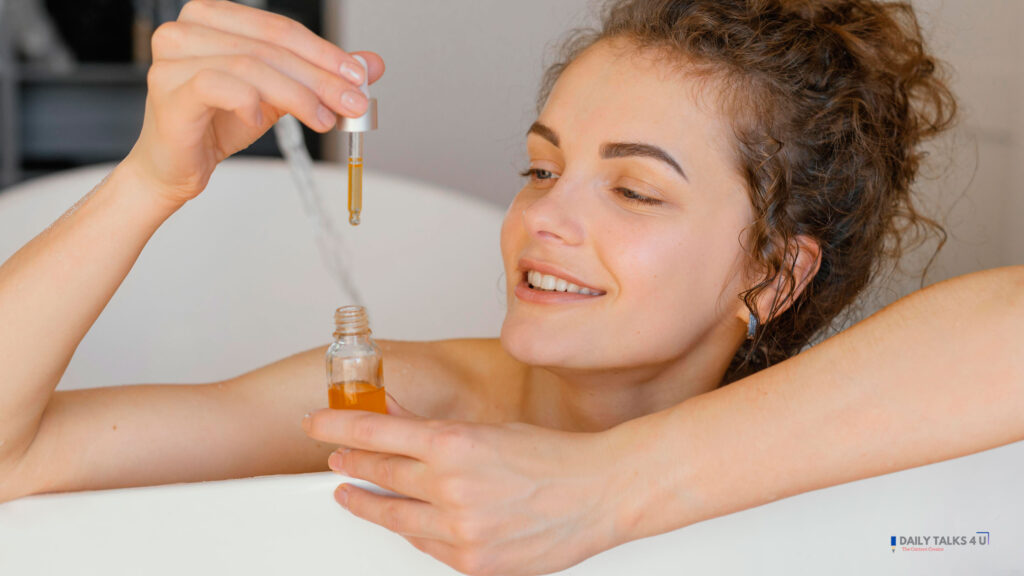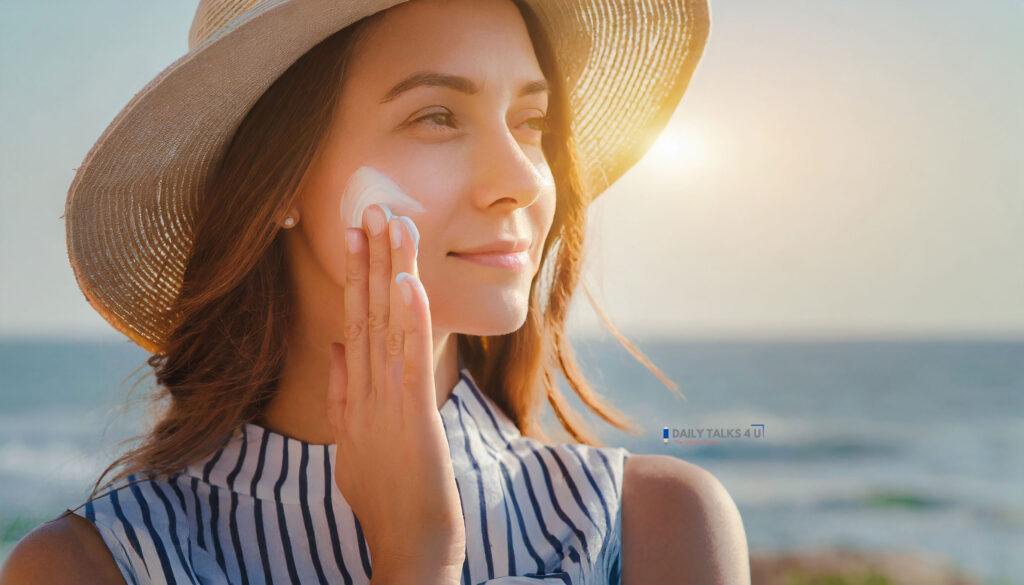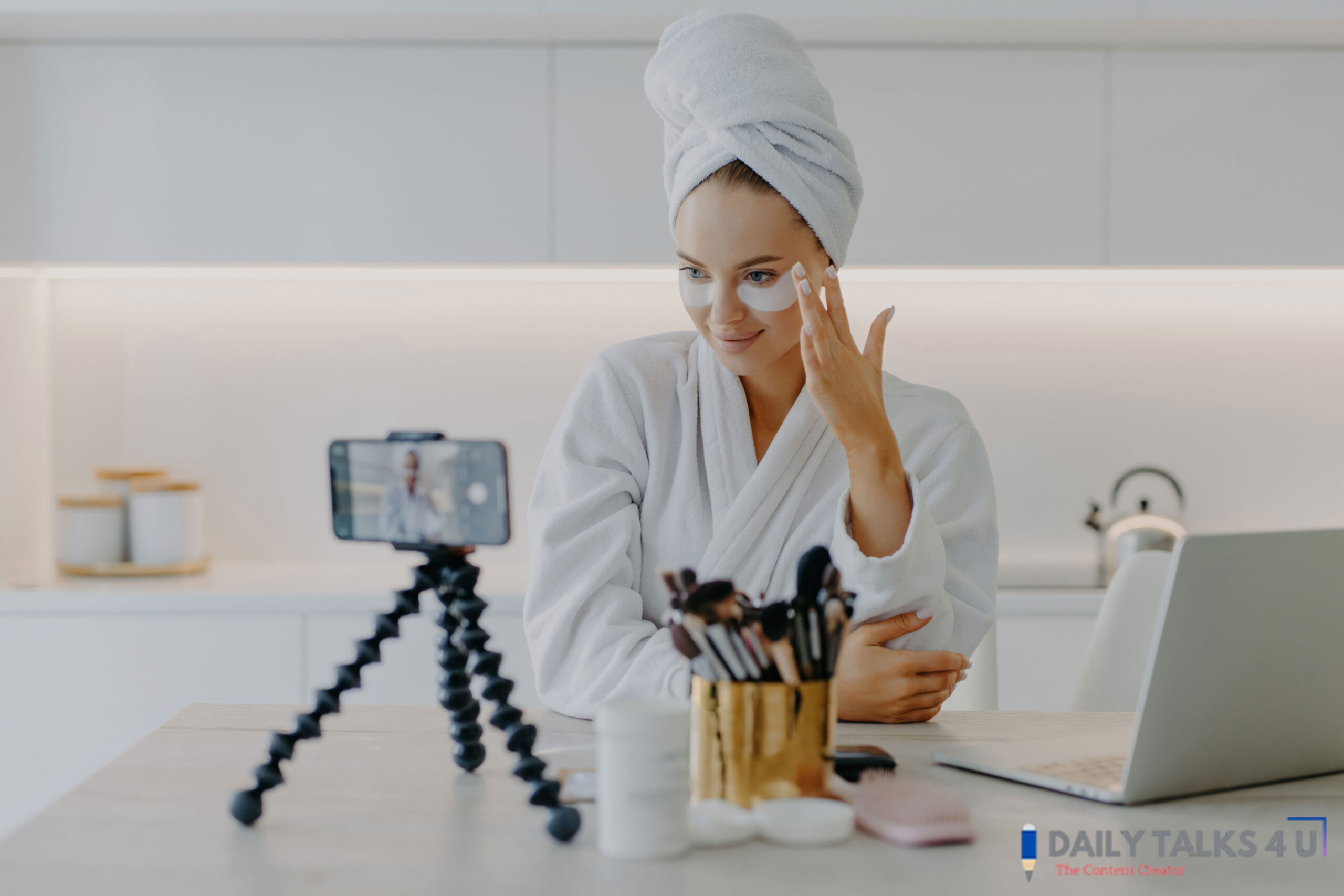We spend a lot of time in front of screens these days, whether they be laptops, smartphones, or tablets. Although the convenience of modern technology cannot be broken, the skincare and cosmetics industry is growing more and more concerned about exposure to blue light.. Blue light from screens, which is sometimes neglected, can affect your skin by speeding up aging, creating hyperpigmentation, and reducing the skin barrier.
This article discusses how to prevent your skin from screen damage and recommends the finest skincare products to include in your routine in 2025. If you’re wondering if blue light protection skincare is worth it, this guide is for you.
What Is Blue Light and Why Is It Important?
Before diving into products, let’s understand the basics.
What is blue light?
HEV (high-energy visible) blue light is a powerful part of the light spectrum, commonly emitted by the sun and everyday devices like smartphones, laptops, and fluorescent lighting. While sunlight is the major source, our prolonged exposure to artificial screen-based blue light is now a growing skin concern.
Why can blue light harm your skin?
Research has shown that blue light:
- Penetrates deeper than UV rays
- Induces oxidative stress leading to skin cell damage
- Leads to premature aging, including the development of fine lines and wrinkles.
- Leads to hyperpigmentation and dark spots
- Disrupts melatonin levels, affecting your skin’s nighttime repair
Key Ingredients That Shield Against Blue Light
Before picking a product, make sure it includes these skin-friendly ingredients on the label.
- Niacinamide – Reduces inflammation, evens skin tone, and helps strengthen the skin barrier.
- Zinc Oxide – A natural mineral sunscreen that reflects blue light and offers physical protection.
- Iron Oxides – Known to block visible light, including blue light. Commonly found in tinted sunscreens and BB creams.
- Lutein & Zeaxanthin – Antioxidants that help neutralize blue light damage.
- “Vitamins C and E neutralize free radicals and boost collagen synthesis.
- Green Tea Extract – Rich in polyphenols that offer antioxidant protection.
Best Skincare Products to Protect Your Skin from Screens (2025 Edition)
Let’s explore the top blue light protection skincare products that have been trending globally in 2025. These products are dermatologist-recommended, influencer-approved, and highly rated by customers worldwide.
1. Supergoop! Unseen Sunscreen SPF 40
This cult-favorite broad-spectrum sunscreen protects your skin from UVA, UVB, and HEV blue light. What makes it special?
- Invisible, oil-free formula that works for all skin tones
- Packed with antioxidants like frankincense and meadowfoam seed
- Acts as a primer under makeup
ideal for: All skin types | Global users
2. SPF 50 Murad City Skin Age Defense
A powerful multi-defense sunscreen that offers protection against:
- Blue light from devices
- Pollution
- Infrared radiation
- UVA/UVB rays
Formulated with polymer matrix and vitamin C, it helps improve skin brightness while defending against environmental aggressors.
Ideal for: Urban dwellers, professionals
3. COOLA 360° Sun Silk Drops with SPF 30
This lightweight serum with SPF offers full-spectrum protection while nourishing the skin with plant stem cells and hyaluronic acid. It’s especially great for layering under moisturizers or makeup.
Key Ingredients:
- Plant-derived antioxidants
- Niacinamide
- Broad-spectrum SPF
Ideal for: Normal to dry skin | Office-goers, students

4. Ilia Super Serum Skin Tan SPF40
For those who love clean beauty, Ilia offers a 3-in-1: serum + SPF + blue light protection.
- Contains non-nano zinc oxide
- Includes squalane, niacinamide, and hyaluronic acid.
- Available in 30+ shades to suit every skin tone
Ideal for: Makeup lovers and minimalist routines
5. The Inkey List C-50 Night Treatment
While you defend your skin during the day, nighttime is crucial for repairing and rejuvenating it.
- Vitamin C to reduce oxidative damage
- Salicylic acid to improve skin texture
- Helps reduce blemishes caused by screen-related stress
Ideal for: Oily, acne-prone, or combination skin
6. Paula’s Choice Defense Essential Glow Moisturizer SPF 30
This moisturizer not only hydrates but also contains:
- Resveratrol and niacinamide for skin tone correction
- Iron oxides to block visible light
- Lightweight, non-greasy formula for everyday use
Ideal for: Sensitive skin, everyday users
7. Derma E Blue Light Defense Concentrated Serum
This is a wallet-friendly option that doesn’t compromise on quality. It features:
- Lutein from marigold flowers
- Activated charcoal to detoxify
- Ginseng to energize tired skin
Ideal for: Students, budget-conscious buyers
8.Photostable Gold Matte Sunscreen Gel SPF 55
This dermatologist-recommended broad-spectrum sunscreen offers powerful SPF 55 protection with a non-greasy, matte finish—perfect for daily wear, especially under makeup. It’s enriched with advanced filters to defend against UVA, UVB, and blue light damage.
Key Benefits:
- With photostable technology, you can shield yourself from blue light exposure from screens and from sun damage.
- Oil-free and non-comedogenic, suitable for acne-prone skin
- Lightweight texture that blends easily without leaving a white cast
Ideal for: Oily to combination skin types, especially in humid climates.

9. Acne UV Gel SPF 50
Acne UV Gel SPF 50 is an oil-free, dermatologist-approved sunscreen specially formulated for sensitive and acne-prone skin. It delivers broad-spectrum protection against UVA, UVB, and blue light without blocking pores or causing breakouts.
Key Benefits:
- Lightweight and non-comedogenic, ideal for everyday wear
- Silicone-based formula leaves a clean, matte finish
- Protects against screen exposure while supporting clearer skin
Ideal for: Oily, sensitive, and acne-prone skin types
10. Cetaphil Sheer Mineral Sunscreen Stick SPF 50
The Cetaphil Sheer Mineral Sunscreen Stick SPF 50 provides easy, no-mess protection formulated with 100% mineral filters like zinc oxide. It’s fragrance-free, gentle, and ideal for quick reapplication wherever you are.
Key Benefits:
- provides all-around protection against blue, UVA, and ultraviolet (UV)B rays.
- Hypoallergenic and non-irritating, tailored for sensitive skin
- For accurate touch-ups around the face and eyes, this compact stick shape is ideal.
Ideal for: Sensitive skin, travellers, and anyone needing on-the-go protection
Daily Habits to Safeguard Your Skin from Digital Devices
Daily Habits to Safeguard Your Skin from Digital Devices
While skincare products are essential, your daily tech habits also play a big role in minimizing blue light damage. Incorporate these smart tips into your routine:
- Switch to dark mode across all your digital devices
- Apply blue light screen protectors on phones, tablets, and laptops
- Practice the 20-20-20 rule: Every 20 minutes, take a 20-second break to look at something 20 feet away.
- Lower screen brightness to the most comfortable, eye-friendly level
- Install apps like f.lux or use Night Shift to add a warm tone to your display, reducing blue light emission
DIY Natural Remedies for Blue Light Skin Support
If you prefer a more natural approach, these DIY remedies can offer some relief from daily screen exposure:
- Green tea toner – Rich in antioxidants to soothe and calm irritated skin
- Turmeric and honey mask – Helps brighten skin and combat oxidative stress
- Aloe vera gel mixed with vitamin E oil – Deeply hydrates and supports overnight skin repair
Note: These remedies support your skin but are not replacements for SPF. Always pair them with proper sun and screen protection for best results.
Travel-Sized Blue Light Protection Kits
If you’re always on the go, pack these travel-sized essentials:
- Mini SPF mist – Reapply over makeup (Supergoop or Coola)
- Hydrating facial mist – With antioxidants (Caudalie or La Roche-Posay)
- Single-use skincare sachets known as portable blue light serum ampoules
Perfect for digital nomads, flight attendants, and remote workers.
FAQ’S:
1.How to protect your skin from computer light?
2.How to protect skin against visible light?
3.Does computer blue light damage skin?
4.Is UV light harmful to skin?
5.Does sunscreen help with screen light?
6.How often should I reapply blue light protection?










